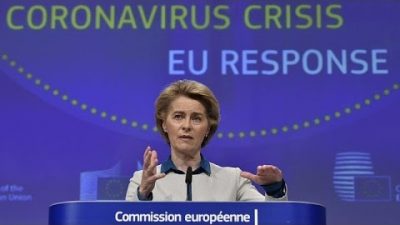Too Little Too Late for EU to Offer Apologies to Italy for Lack of Coronavirus Support

Italy has been affected by the coronavirus more than any other European country, with over 168,000 confirmed cases and 22,000 deaths. Europe is mobilizing to help Italy but this has not always been the case, and rather was a reaction to the Russian, Chinese and Turkish assistance given to the Mediterranean country. In the early days of the crisis, in the face of a need for a common European response as would be expected from the European Union, too many, especially Germany, thought only of their own problems, making a mockery of Western liberalism.
The self-serving interests were harmful and could have avoided thousands of deaths in Italy. Social distancing is a must between individuals to prevent the spread of the virus and fundamental for our safety, but the distance between European nations, on the contrary, puts everyone in danger and is exactly what happened when coronavirus began to devastate Italy. From the beginning of the pandemic, the European Union refused to coordinate to deal with the enormity of the crisis.
The European Union’s lacklustre response to the crisis saw Professor Mauro Ferrari quit his position as President of the European Research Council when he became frustrated with the bloc’s inaction to create a dedicated research programme into coronavirus.
“I arrived at the European Research Council a fervent supporter of the European Union [but] the Covid-19 crisis completely changed my views, though the ideals of international collaboration I continue to support with enthusiasm,” he told the Financial Times.
The ERC however hit back, saying
“During his three-month term in office, Professor Ferrari displayed a complete lack of appreciation for the raison-d’être of the ERC to support excellent frontier science, designed and implemented by the best researchers in Europe.”
Rather than assisting Italy, Brussels was too busy engaging in a war of words with a renowned professor who was frustrated as he was restricted from dealing with the coronavirus in an effective manner. Instead Italy had to rely on assistance from Cuba, Albania, Turkey, China and Russia among others to deal with the public health emergency.
This has caused the European Union to have a change in pace and now millions of masks have been delivered to Italy. The mobilization of aid from non-European Union countries to Italy significantly embarrassed the bloc, forced it into action, and has even humbled it now.
European Union Commission President Ursula von der Leyen extended a “heartfelt apology” to Italy on behalf of Europe, admitting that it had not been by its side since the beginning of the crisis.
“It’s right that Europe offers its heartfelt apology,” she said when speaking at a debate in the European Parliament on Thursday. She added that “too many were not there on time when Italy needed a helping hand at the very beginning.”
However, she went on to claim that “Europe has now become the world’s beating heart of solidarity.” She of course did not mention that Russia was one of the very few countries to help the Mediterranean country, resulting in an increase of Russophilia and anti-European Union sentiment among the local people .
For many Italians, the apology is not good enough and it is inexcusable that the European Union was not there for them in their hour of need. Many in Italy will not forget that and it will certainly become a major talking point in future Italian elections and in debates on Rome’s relations with Moscow in the post-coronavirus world.
Although der Leyen claims that Europe is the “beating heart of solidarity,” it is Turkey that has provided aid to 24 different countries from North America to South America, Africa to Asia, and across Europe. Although Turkey is engaging on this mission of good will to improve its reputation after it received international condemnation because of their attempt to asymmetrically invade Greece with illegal immigrants, it has proven to be more of a “beating heart of solidarity” than the European Union has.
Last week during a meeting of European Union finance ministers discussing a financial rescue package, a clear division was seen between northern European countries and the Mediterranean European countries. Led by the Netherlands, the wealthier northern European countries refused to back a rescue package that would soften the economic blow the coronavirus pandemic has caused to southern European countries.
While der Leyen makes apologies and propagandizes that the European Union is the “world’s beating heart of solidarity,” the facts are proven on the ground – while northern Europe contracted to protect state interests, it was non-European Union members who mobilized to assist Italy. This will prove to be a decisive soft power victory for Russia, China and Turkey and will have great geopolitical ramifications in the post-coronavirus world.
*
Note to readers: please click the share buttons above or below. Forward this article to your email lists. Crosspost on your blog site, internet forums. etc.
This article was originally published on InfoBrics.
Paul Antonopoulos is a Research Fellow at the Center for Syncretic Studies.
Featured image is from InfoBrics

